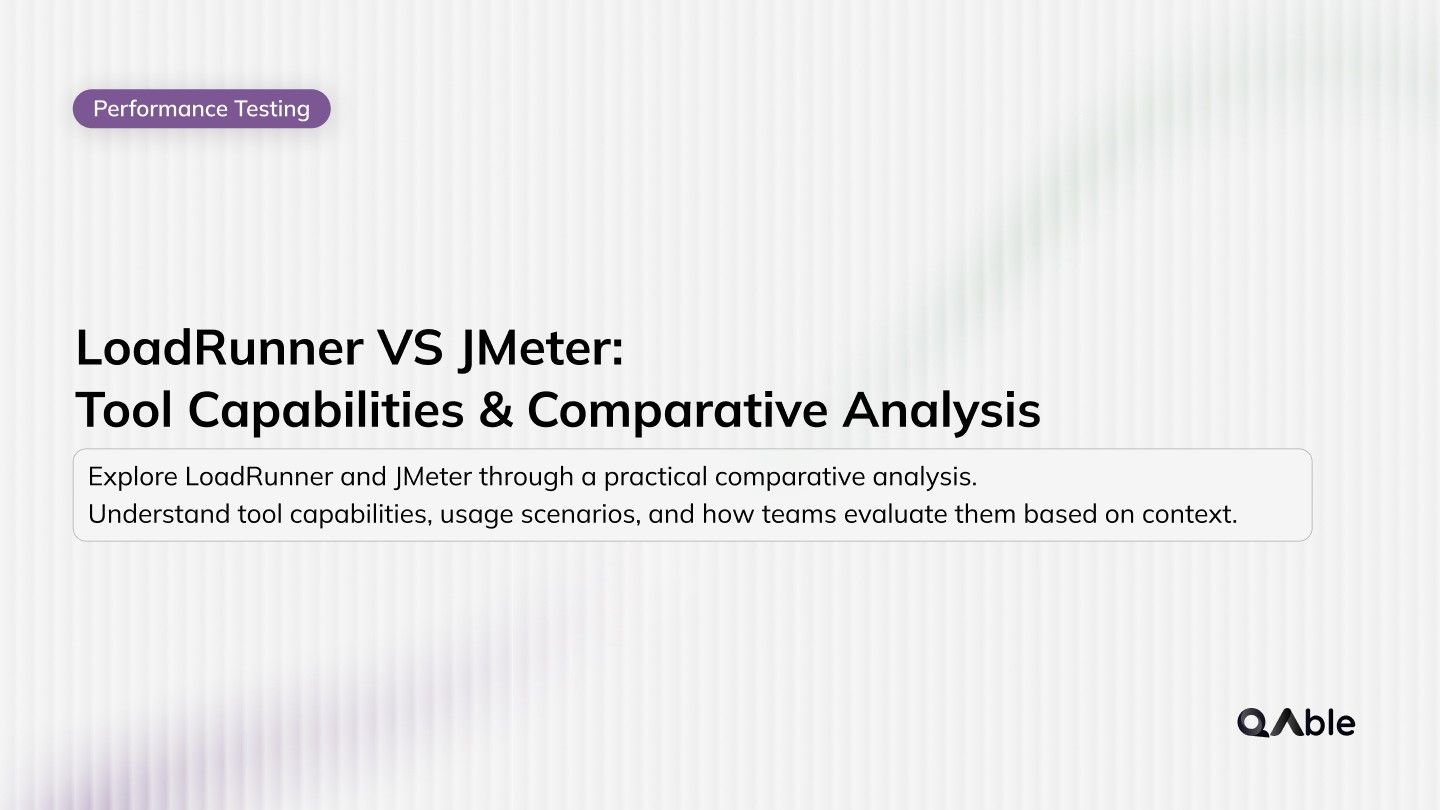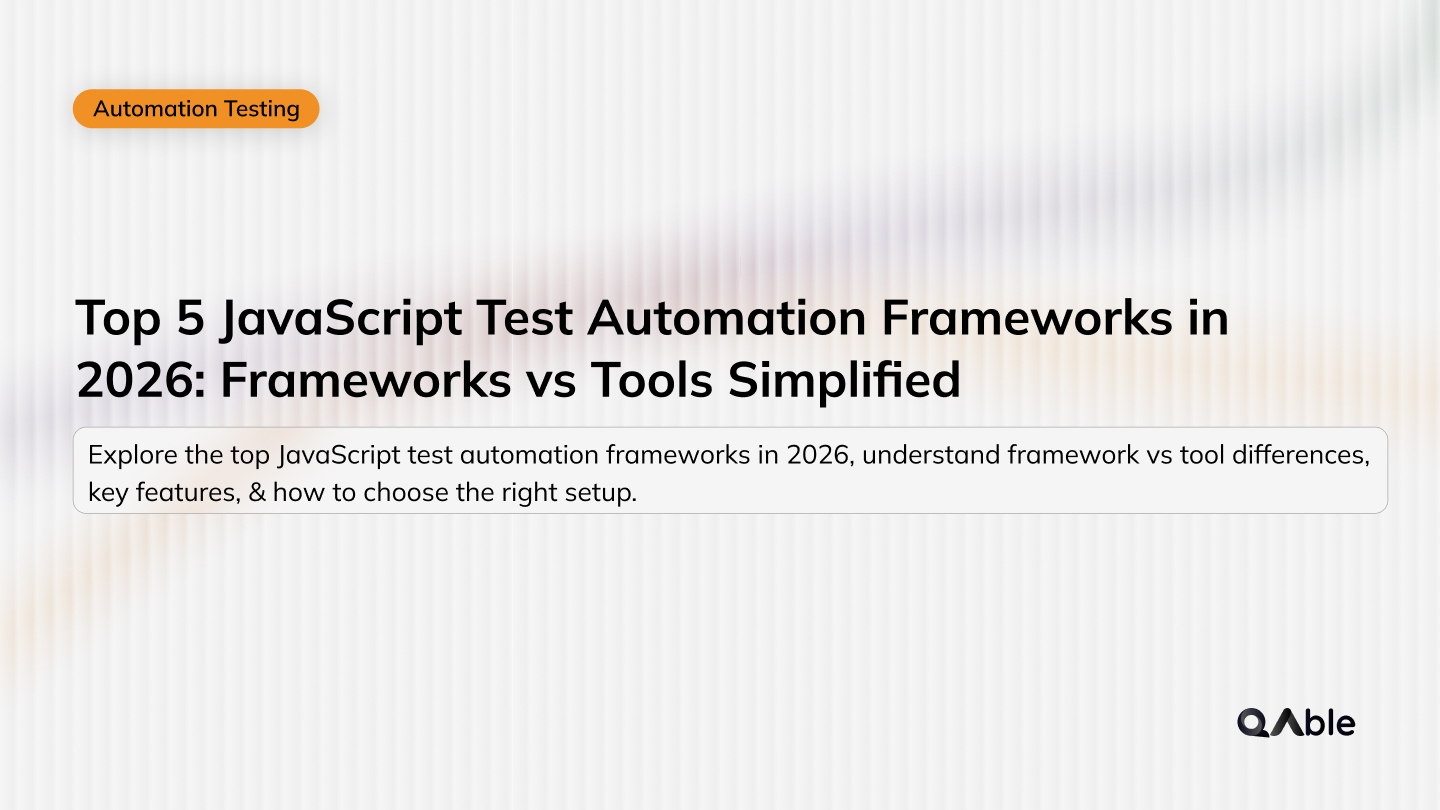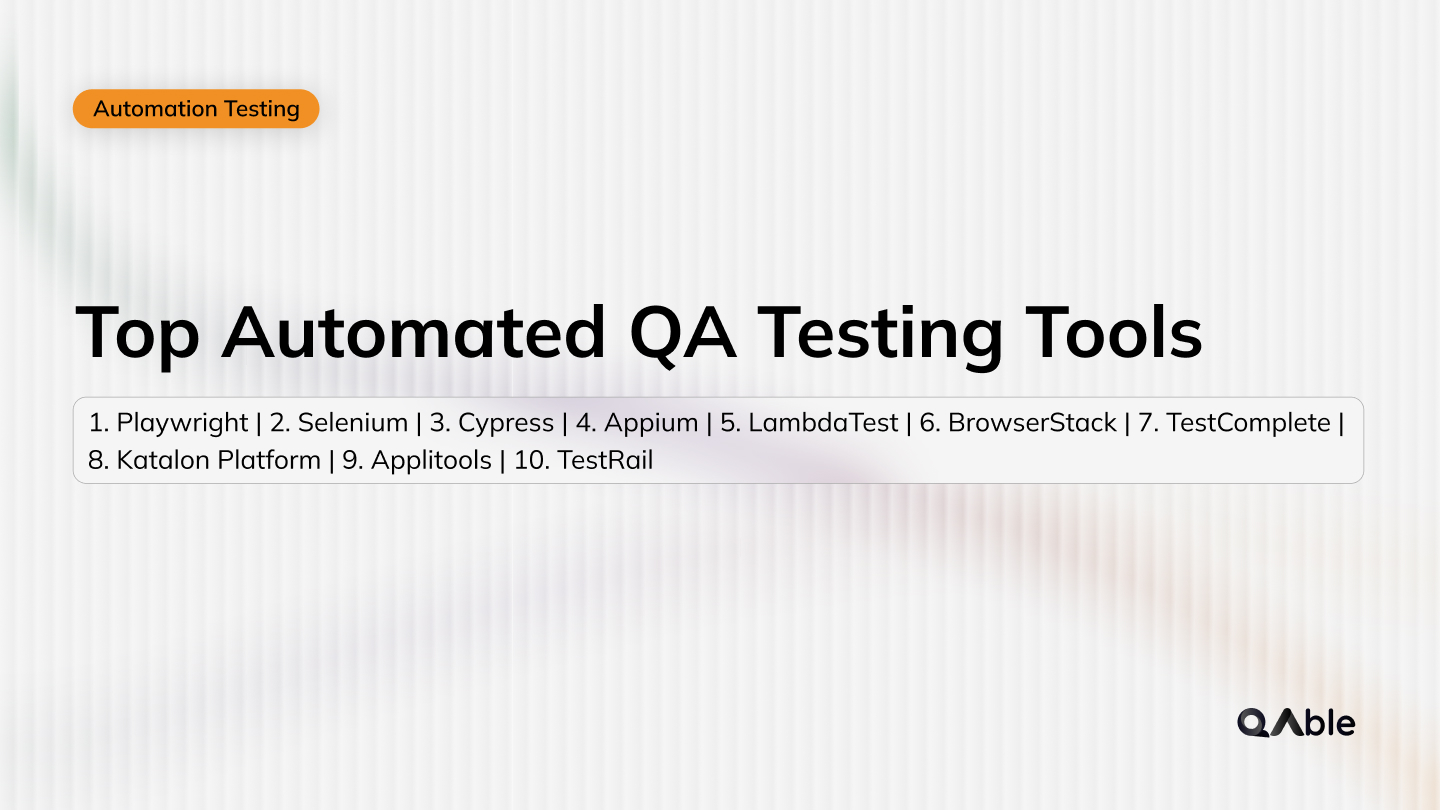Table of content
SHARE THIS ARTICLE
Is this blog hitting the mark?
Contact Us
Table of Contents
- Why Automation Testing Matters in FinTech?
- Challenges of Quality Assurance in FinTech
- Automation: Your solution for QA in FinTech
- Advanced Automation Tools for QA in FinTech
- Benefits of Automation Testing for FinTech
- Best Practices for Implementing Automation Testing in FinTech
- FAQs
In the rapidly evolving fintech ecosystem, ensuring control, safety, and accuracy is critical. Quality cannot be compromised. From payment processing to online banking and investment management, fintech applications must function seamlessly in terms of both processes and user experience. QA plays a critical role in this context.
However, traditional approaches to QA can be labor-intensive, time-consuming, and less accurate, especially given the intricacies of financial systems. This is where automation testing becomes a key player in software development.
But first, let’s explore in this blog, the hurdles a QA team faces in fintech before examining how automation can help.
Why Automation Testing Matters in FinTech?
FinTech companies are under constant pressure to provide secure, reliable, and user-friendly services while complying with industry regulations. This makes QA a critical part of the development process. Traditional manual testing, while effective in some cases, often struggles to keep up with the high-speed, high-stakes world of FinTech.
Automation testing can rapidly and accurately run extensive test cases, offering a faster, more scalable, and less error-prone solution than manual QA processes. It enables continuous testing throughout the software lifecycle, ensuring that code changes or updates don’t introduce bugs or security vulnerabilities. This is particularly important for FinTech, where real-time financial transactions and sensitive data processing are the norm.
Also read: How important is QA for Fintech companies
Challenges of Quality Assurance in FinTech
Before exploring automation as a solution, it’s essential to understand the unique challenges that FinTech companies face in quality assurance. These challenges set the stage for why automation is increasingly becoming a necessity rather than an option.
Security Compliance
FinTech applications deal with highly sensitive financial information, which makes security compliance a top priority. Regulations such as PCI DSS (Payment Card Industry Data Security Standard) require rigorous security protocols to protect customer data and transactions. Ensuring that all security standards are met is a huge challenge, and even a small oversight can lead to severe legal consequences or a loss of customer trust.
Handling Large Transactional Data with Accuracy
In FinTech, the volume of transactional data is massive, and ensuring that each transaction is processed accurately is critical. This requires intensive validation to avoid issues like incorrect fund transfers, failed payments, or inaccuracies in financial reporting. Manual testing can need help to handle such large-scale testing efficiently and error-free.
The Need for Continuous Testing Due to Frequent Updates
FinTech companies regularly release updates and new features to stay competitive and meet customer demands. With each release, QA teams need to ensure that no new bugs are introduced and that the application remains secure. Continuous testing is vital, but manually testing every update can slow down the deployment process.
Cross-Platform Testing (Mobile Apps, Web Interfaces, APIs)
FinTech applications must perform flawlessly across various platforms, including mobile apps, web browsers, and even APIs that integrate with third-party services. Testing across multiple platforms and devices manually is labor-intensive and prone to errors, especially with the growing number of devices that need to be supported.
Keeping Up with Customer Expectations for Flawless Performance
Customer expectations in FinTech are high, and they demand fast, secure, and user-friendly applications. Any downtime, slow transaction processing, or security breaches can lead to dissatisfied users and a damaged reputation. Ensuring that the application consistently performs well under different conditions is a significant challenge for QA teams.
Automation: Your solution for QA in FinTech
Now that we have identified the primary QA challenges in FinTech, it’s clear why Automation Testing in FinTech is a crucial solution. Automation allows QA teams to tackle repetitive tasks, perform complex test scenarios quickly, and reduce the risk of human errors.
Automation testing involves using specialised software tools to execute predefined test cases without manual intervention. This form of testing is ideal for FinTech because it ensures continuous, accurate, and fast testing throughout the software development lifecycle. Whether it’s testing for payment gateway functionality, verifying transaction accuracy, or ensuring regulatory compliance, automation helps streamline these processes.
Why Automation Is the Best Fit for the Sector
FinTech requires continuous testing to maintain security and reliability across its platforms.
Automation helps by:
Speeding up execution: Automated tests can run much faster than manual tests, allowing QA teams to validate large sets of data and processes quickly.
Reducing human errors: Repetitive testing tasks are prone to human errors, but automation can ensure consistency across all tests.
Handling complex scenarios: Automated tests can simulate a wide range of real-world scenarios, including user transactions, system failures, and peak traffic loads.
Enhancing security testing: Automated tools can rigorously test security measures like encryption, firewalls, and authentication protocols.
Advanced Automation Tools for QA in FinTech
To successfully implement FinTech QA automation, choosing the right tools is crucial.
Below are some of the advanced automation tools for QA in the FinTech industry.
Top Automation Testing Tools
Here are some popular FinTech software testing tools used for automation:
Selenium: Selenium is widely used for automating web applications across different browsers. Given that many FinTech services are delivered through web-based platforms, Selenium is an ideal tool for testing user interfaces, functional flows, and security features.
Appium: Appium is essential for mobile application testing, especially for FinTech companies offering mobile banking and payment apps. It supports cross-platform testing, enabling testers to use a single script to test apps on both Android and iOS.
TestComplete: A versatile automation testing tool that supports functional testing for desktop, web, and mobile applications. It’s useful in streamlining FinTech quality assurance and testing various user scenarios in complex financial applications.
Postman and SoapUI: Both these advanced automation tools for QA tools are extensively used for API testing in FinTech. APIs are the backbone of financial transactions, payment gateways, and account verification processes. Postman and SoapUI ensure these APIs perform accurately and securely under varying conditions.
The Role of APIs in FinTech Testing
APIs play a crucial role in enabling different systems to communicate securely and reliably, whether it’s processing payments, accessing customer account data, or integrating with third-party services like payment processors or investment platforms.
API testing in FinTech ensures that APIs can handle real-time transactions, meet security standards, and integrate seamlessly with other systems. Automated API testing can rapidly validate these systems, preventing costly errors at the time of FinTech QA automation.
You can have an in-house team for the same or you can consult a reputed financial application testing service provider to know more about APIs.
CI/CD Integration
Automated testing becomes even more powerful when integrated into CI/CD pipelines. Continuous Integration/Continuous Deployment (CI/CD) ensures that code changes are continuously tested, allowing FinTech companies to release updates faster without sacrificing quality. This is especially critical for FinTech platforms, which must regularly release security patches, feature enhancements, and bug fixes.
Benefits of Automation Testing for FinTech
The advantages of automation testing in FinTech are numerous.
Here’s a breakdown of the key benefits:
Speed
Automated tests run significantly faster than manual tests, enabling rapid execution of thousands of test cases. This is critical for large-scale FinTech applications that process real-time transactions.
Accuracy
Automation reduces human errors, which is especially important when dealing with sensitive financial data. Accurate testing ensures that transactions, balances, and account data remain consistent across the application.
Security
Automated testing ensures that security protocols like encryption, authentication, and data privacy are enforced consistently. Regular security tests can be integrated into the CI/CD pipeline to ensure continuous compliance with industry regulations.
Scalability
Automated testing scales with your application. Whether you’re handling a hundred transactions or a million, automation ensures that each one is validated correctly at the time of financial software testing.
Cost-Effectiveness
While the initial setup for automation may be costly, it pays off in the long term by reducing manual labor, improving accuracy, and speeding up testing processes. This leads to fewer defects and quicker time-to-market, saving significant costs over time. A reputed provider of automated QA solutions for financial services can also help you to reduce costs in the long run.
What to Watch Out For When Automating QA
Although automation is incredibly beneficial, there are certain challenges and pitfalls to be aware of when streamlining FinTech quality assurance:
Over-Automation
Not all tests should be automated. Some tests, especially exploratory or UI/UX testing, may require human judgment and creativity.
Initial Setup Time
The initial setup for automation can be time-intensive, and companies must invest in building a robust test automation framework.
Maintenance
Automated tests require regular maintenance to stay relevant, especially when the application undergoes frequent updates or changes.
Also read: Fintech App Testing Strategy :What and How?
Best Practices for Implementing Automation Testing in FinTech
To ensure successful implementation of automation, consider these QA best practices in FinTech:
Early Integration of Automation
Incorporate automation testing early in the development lifecycle to catch bugs and security flaws as soon as possible.
Continuous Integration and Testing
Automate testing as part of your CI/CD pipeline to ensure that tests are continuously run as new code is integrated.
Security Testing
Automate security testing to ensure that encryption, authentication, and other security measures are robust and up-to-date at the time of financial software testing.
Scalability
Build your automation framework to scale with your application, ensuring it can handle increasing volumes of transactions and users.
Comprehensive Coverage
Aim for comprehensive test coverage, including functionality, performance, security, and regulatory compliance.
Automation is Non-Negotiable for FinTech Success
In the competitive and highly regulated FinTech sector, automation testing is a critical tool for ensuring high-quality software, faster releases, and secure financial services. As FinTech companies continue to evolve and expand their services, automation testing will play an essential role in maintaining operational excellence and meeting customer expectations.
By adopting advanced automation tools and integrating them into QA processes, FinTech firms can ensure that they remain agile, compliant, and secure in a fast-moving digital landscape.
QAble, a reputed financial application testing company, specializes in delivering secure, compliant, and automated QA solutions for financial services. With a strong focus on automation and industry-specific expertise, QAble ensures that your FinTech applications meet the highest standards of quality and security.
Discover More About QA Services
sales@qable.ioDelve deeper into the world of quality assurance (QA) services tailored to your industry needs. Have questions? We're here to listen and provide expert insights


Nishil Patel is the Co-founder of QAble, delivering advanced test automation solutions with a focus on quality and speed. He specializes in modern frameworks like Playwright, Selenium, and Appium, helping teams accelerate testing and ensure flawless application performance.
.svg)














.webp)
.webp)
.png)
.png)











.png)



.png)

.png)

.png)






.jpg)






.jpg)
.jpg)
.jpg)




.webp)

